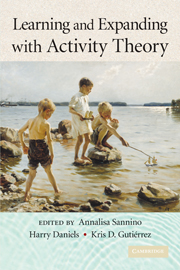Book contents
- Frontmatter
- Contents
- Contributors
- Editors' introduction
- 1 Activity Theory Between Historical Engagement and Future-Making Practice
- PART ONE UNITS OF ANALYSIS
- PART TWO MEDIATION AND DISCOURSE
- PART THREE EXPANSIVE LEARNING AND DEVELOPMENT
- 8 The Concept of Development in Cultural-Historical Activity Theory: Vertical and Horizontal
- 9 Two Theories of Organizational Knowledge Creation
- 10 Contradictions of High-Technology Capitalism and the Emergence of New Forms of Work
- 11 Spinozic Reconsiderations of the Concept of Activity: Politico-Affective Process and Discursive Practice in Transitive Learning
- PART FOUR SUBJECTIVITY, AGENCY, AND COMMUNITY
- PART FIVE INTERVENTIONS
- Bibliography
- Author Index
- Subject Index
11 - Spinozic Reconsiderations of the Concept of Activity: Politico-Affective Process and Discursive Practice in Transitive Learning
Published online by Cambridge University Press: 05 June 2012
- Frontmatter
- Contents
- Contributors
- Editors' introduction
- 1 Activity Theory Between Historical Engagement and Future-Making Practice
- PART ONE UNITS OF ANALYSIS
- PART TWO MEDIATION AND DISCOURSE
- PART THREE EXPANSIVE LEARNING AND DEVELOPMENT
- 8 The Concept of Development in Cultural-Historical Activity Theory: Vertical and Horizontal
- 9 Two Theories of Organizational Knowledge Creation
- 10 Contradictions of High-Technology Capitalism and the Emergence of New Forms of Work
- 11 Spinozic Reconsiderations of the Concept of Activity: Politico-Affective Process and Discursive Practice in Transitive Learning
- PART FOUR SUBJECTIVITY, AGENCY, AND COMMUNITY
- PART FIVE INTERVENTIONS
- Bibliography
- Author Index
- Subject Index
Summary
In this chapter, we attempt to articulate and expand the concept of activity by applying Spinoza's idea concerning human collective activeness. Though rarely discussed in an activity-theoretical research context, Spinoza's idea, we believe, has multifaceted implications for advancing and supplementing the concept of activity. Among these, we will focus on three. First, concerning the ontological articulation of the concept of activity, we will briefly discuss the connection between Spinoza and Vygotsky. Second, we will, on the basis of Spinozic anthropology, focus on what is called politico-affective process in human local interaction. Third, we will discuss discursive practice, a form of activity in Spinozic anthropology, and, specifically, its significance in the transitive learning process of student nurses.
PRIMORDIAL ARTICULATION OF THE CONCEPT OF ACTIVITY
It is widely held that the historical origin of activity theory was German idealist philosophy and that the activity concept was fully developed in Marx's writings, with the concept being introduced to psychology by Vygotsky (Davydov, 1999b; Engeström, 1999a; Kasavin, 1990; Lektorsky, 1999; Tolman, 2001). As it is rare for Spinoza's ideas to be regarded as a philosophical foundation of activity theory, it seems rather strange for a scientific explication of the activity concept to draw on the ideas of Spinoza, who has been depicted as a “god-intoxicated” pantheist.
However, Spinoza has unquestionably been an extremely influential philosophical source of activity theory, as evidenced by the wide-ranging impact his work has had on the philosophical founders of activity theory, particularly on Marx.
Information
- Type
- Chapter
- Information
- Learning and Expanding with Activity Theory , pp. 176 - 194Publisher: Cambridge University PressPrint publication year: 2009
Accessibility standard: Unknown
Why this information is here
This section outlines the accessibility features of this content - including support for screen readers, full keyboard navigation and high-contrast display options. This may not be relevant for you.Accessibility Information
- 4
- Cited by
